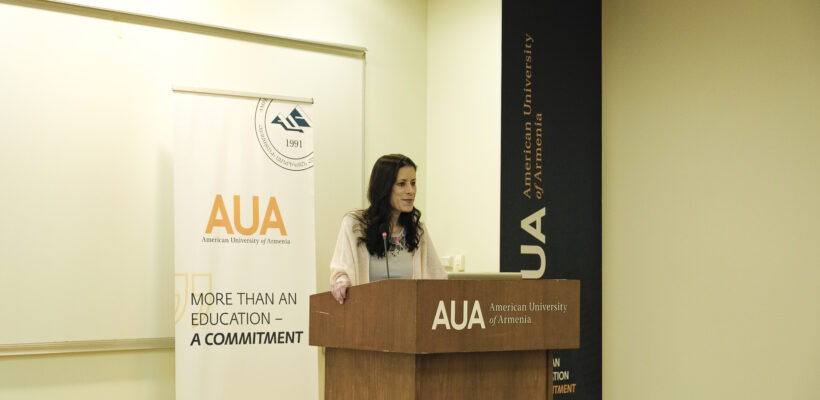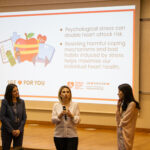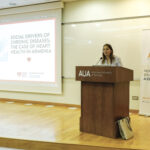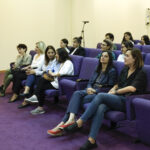
Turpanjian College of Health Sciences Celebrates World Heart Day
3 min read
YEREVAN, Armenia — September 29 is celebrated as World Heart Day and observed annually to spread awareness of cardiovascular diseases and how to control them. This year, ahead of the global event, the American University of Armenia (AUA) Turpanjian College of Health Sciences (CHS) organized a panel discussion to inform the community about the burden of chronic diseases, societal influences on disease risk, and prevention and control measures.
The event featured a presentation on “Social Drivers of Chronic Diseases: the Case of Heart Health in Armenia” delivered by Dr. Carla Berg, professor and associate chair for research in the Department of Prevention and Community Health at George Washington University’s Milken Institute School of Public Health and associate center director for Population Sciences and Policy at the George Washington University Cancer Center. She has joined the CHS as a Fulbright Scholar this academic year.
Dr. Berg presented the global and local burden of chronic diseases and their social drivers by illustrating each of them with the example of tobacco use. In her lecture, she reflected on the World Health Organization’s framework for understanding such social drivers, including access to and quality of education, healthcare quality, neighborhood and built environment, social and community context, and economic stability. Dr. Berg then went on to emphasize that the list is not exhaustive as more factors are being explored and will be acknowledged in the future. “Recent years have marked a true appreciation of these social and structural determinants of health and health disparities, and COVID-19 increased awareness of these contextual factors. We are just scratching the surface in terms of understanding and measuring them, and there is so much work to do to address them and advance health equity globally,” she highlighted.
The presentation was followed by a panel discussion featuring Dr. Nour Alayan and Dr. Kristine Poghosyan. The discussion touched upon the societal and behavioral factors contributing to cardiovascular diseases, including tobacco and alcohol use, and physical inactivity, especially among the younger generation in Armenia. Dr. Alayan, associate professor and the inaugural chair of the Bachelor of Science in Nursing (BSN) program, discussed the interconnection between the brain and the heart, highlighting heart rate variability as a simple and trending measure of heart health, resilience, and well-being in general. She further explained that “People with heart disease were found to have low heart rate variability and researchers have been exploring innovative ways to increase heart rate variability. One way is to practice paced breathing at a slow rate of about six breaths per minute, although this needs some training.” Dr. Alayan, who is also a Stop Smoking Practitioner and a behavioral health specialist, shared her concern about the emerging trend of vaping among adolescents and even children. “Nurses have an important role in partnering with physicians to screen for all types of substance use — smoking, vaping, alcohol, or other drugs — among children and adolescents so that they can intervene early on and attempt to lower future disease burden,” she noted.
Dr. Kristine Poghosyan (MPH ‘18), AUA alumna and cardiologist at the Nork Marash Medical Center spoke about her daily experiences with patients. Dr. Poghosyan acknowledged the suboptimal level of attention paid to social determinants of chronic diseases during patient encounters, stressing that efforts at the individual level are insufficient for realizing population-level change.
The panelists also highlighted the positive impact healthy living can have on heart health and overall well-being, including mental health.
The AUA Turpanjian College of Health Sciences works actively to improve population health and health services in Armenia and the region through interdisciplinary education and development of health professionals to be leaders in public health, nursing, health services research, and evaluation, health care delivery, and management.












